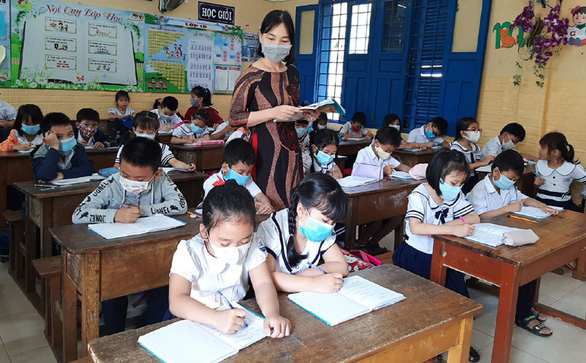A child's first day of school – a landmark moment for the youngest students and their parents around the world – has been delayed due to COVID-19 for an estimated 140 million young minds, about 30 million in East Asia and Pacific Region (EAPR), UNICEF said in a new analysis released as summer break comes to end in many parts of the world.
For an estimated eight million of these students globally, and about three million in EAPR, the wait for their first day of in-person learning has been over a year and counting, as they live in places where schools have been closed throughout the pandemic, the UN agency said in a press release on Thursday.
"The first day of school is a landmark moment in a child's life – setting them off on a life-changing path of personal learning and growth,” said UNICEF executive director Henrietta Fore.
“Most of us can remember countless minor details – what clothes we wore, our teacher's name, who we sat next to.
“But for millions of children, that important day has been indefinitely postponed.”
"As classes resume in many parts of the world, millions of first graders have been waiting to see the inside of a classroom for over a year.
“Millions more may not see one at all this school term.
“For the most vulnerable, their risk of never stepping into a classroom in their lifetime is skyrocketing."
Early learning, including pre-elementary and the first grade of elementary, sets up the building blocks for all future learning, with introductions to reading, writing, and math.
It is also a period when in-person learning helps children gain independence, adapt to new routines, and develop meaningful relationships with teachers and students.
In-person learning also enables teachers to identify and address learning delays, mental health issues, and abuse that could negatively affect children’s well-being.
In 2020, schools globally were fully closed for an average of 79 teaching days.
However, for 168 million students, at least 34 million in East Asia and Pacific, after the pandemic began, schools were shuttered for nearly the entire year.
Even now, many children are facing an unprecedented second year of disruption to their education.
The associated consequences of school closures – learning loss, mental distress, missed vaccinations, and heightened risk of dropping out, child labor, and child marriage – will be felt by many children, especially the youngest learners in critical development stages.
While countries worldwide are taking some actions to provide remote learning, at least 29 percent of elementary students globally and 20 percent of elementary students in East Asia and Pacific or 80 million are not covered.
In addition to a lack of assets for remote learning, the youngest children may not be able to participate due to the absence of support using the technology, a poor learning environment, pressure to do household chores, or being forced to work.
Studies have shown that positive school experiences during this transition period are a predictor of children’s future social, emotional, and educational outcomes.
At the same time, children who fall behind in learning during the early years often stay behind for the remaining time they spend in school, and the gap widens over the years.
The number of years of education a child receives also directly affects their future earnings.
Unless mitigation measures are implemented, the World Bank estimates a loss of US$10 trillion in earnings over time for this entire generation of students.
For the Asian Development Bank, the value of these losses is estimated at $1.25 trillion for developing Asia, equivalent to 5.4 percent of the region’s 2020 gross domestic product.
Existing evidence shows the cost of addressing learning gaps are lower and more effective when they are tackled earlier, and that investments in education support economic recovery, growth, and prosperity.
“Closing schools must be a temporary measure of last resort in pandemic response and schools should be the first to open when [restrictions] are lifted,” said Rana Flowers, UNICEF representative to Vietnam.
“The urgent vaccination of all teachers will protect them from community transmission and help keep them healthy so they can continue the inspiring work they do in the classroom.
“Despite all the online efforts, all children have lost some learning, and too many have lost months of valuable lessons and motivation.
“It will be essential that an extended period of catch-up classes prioritized to ensure that children who have been unable to learn remotely are not left behind.”
Like us on Facebook or follow us on Twitter to get the latest news about Vietnam!




















































